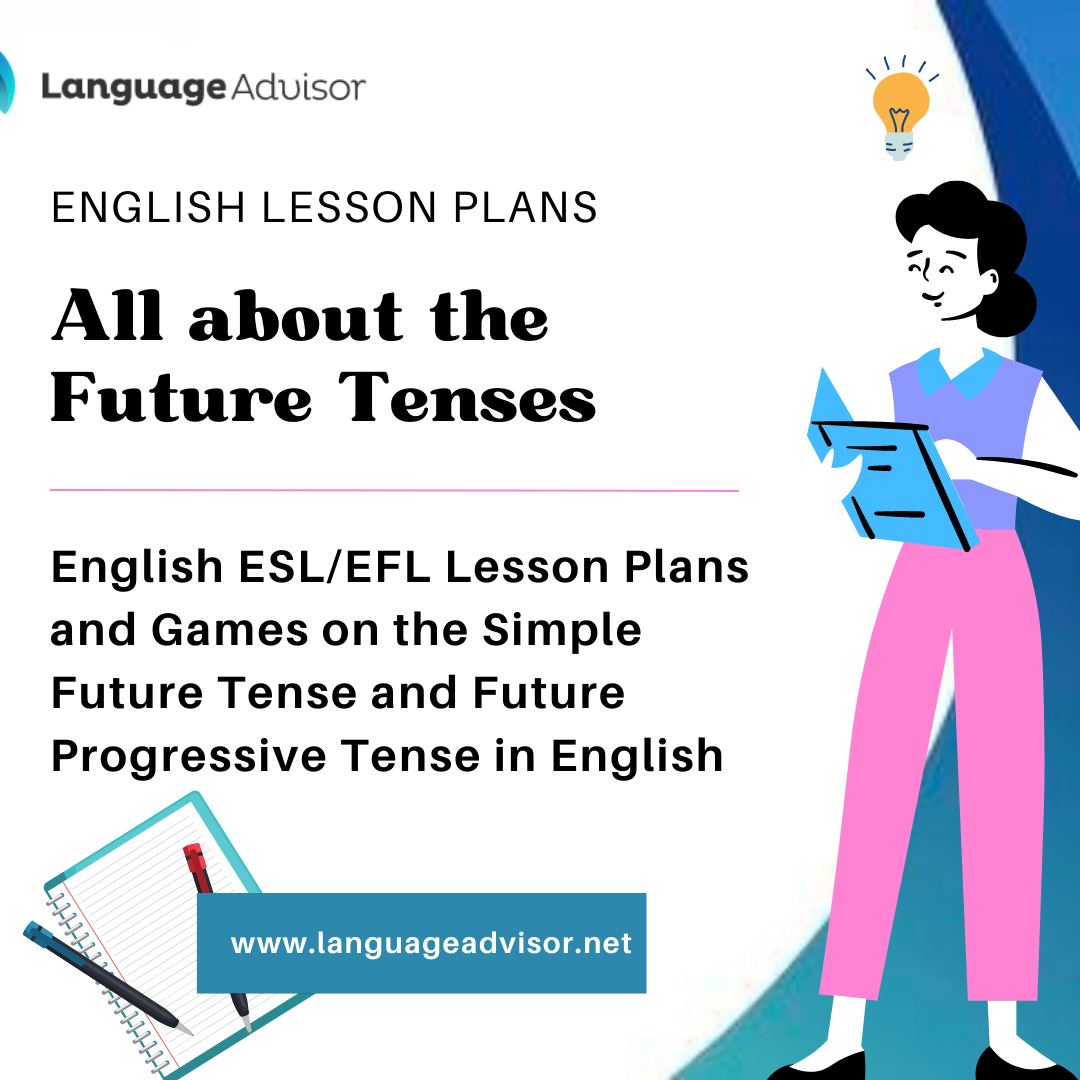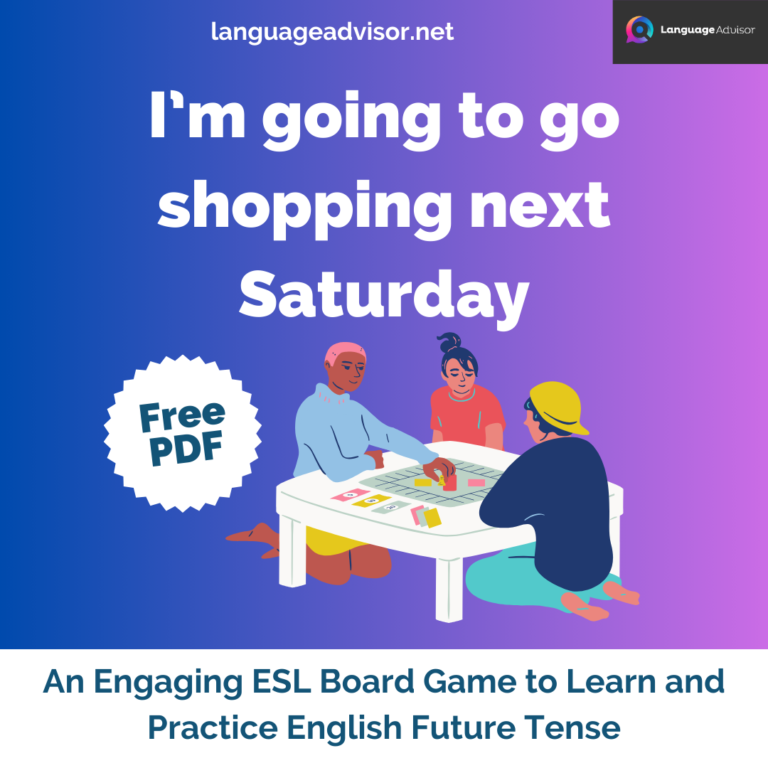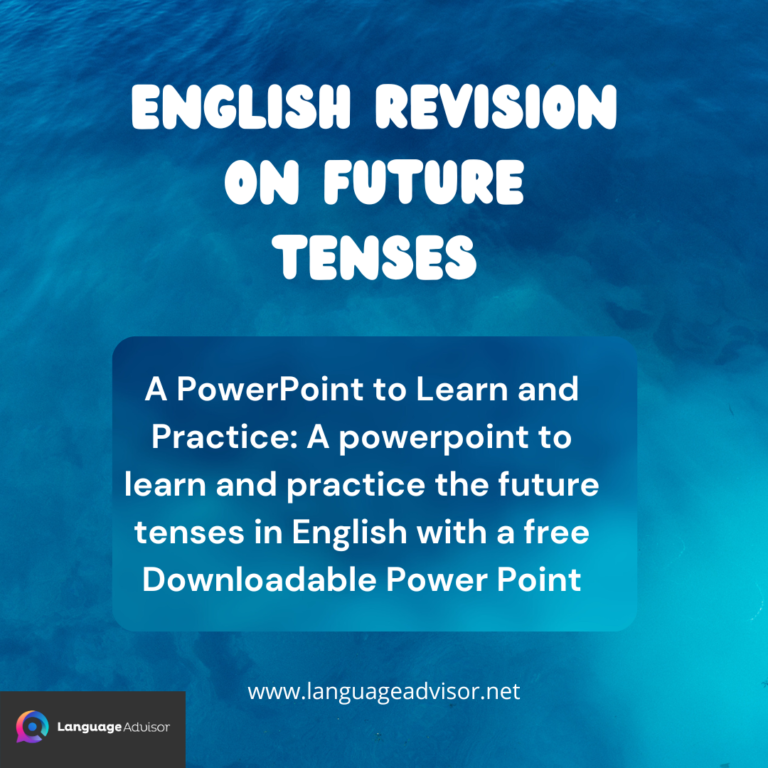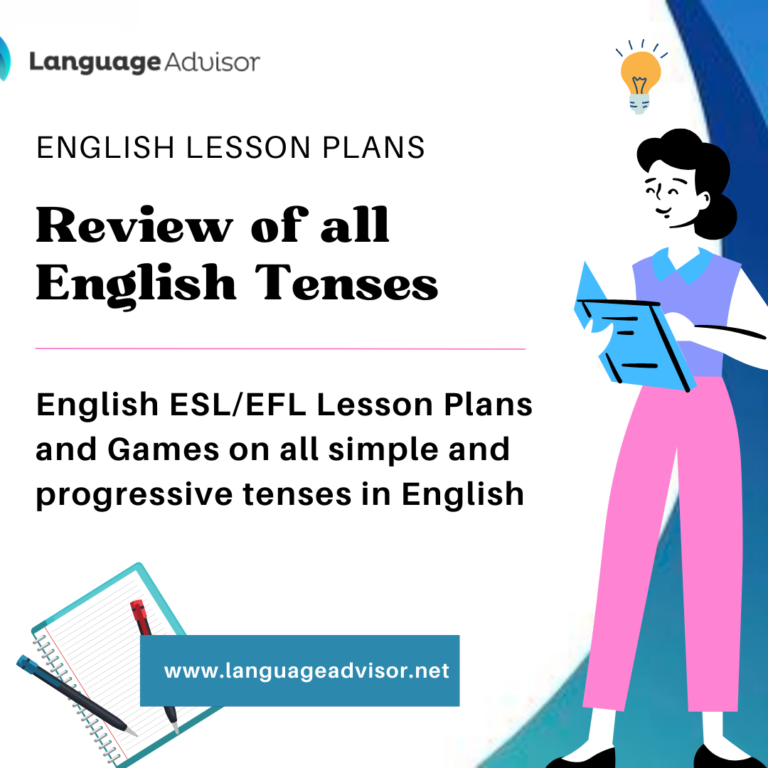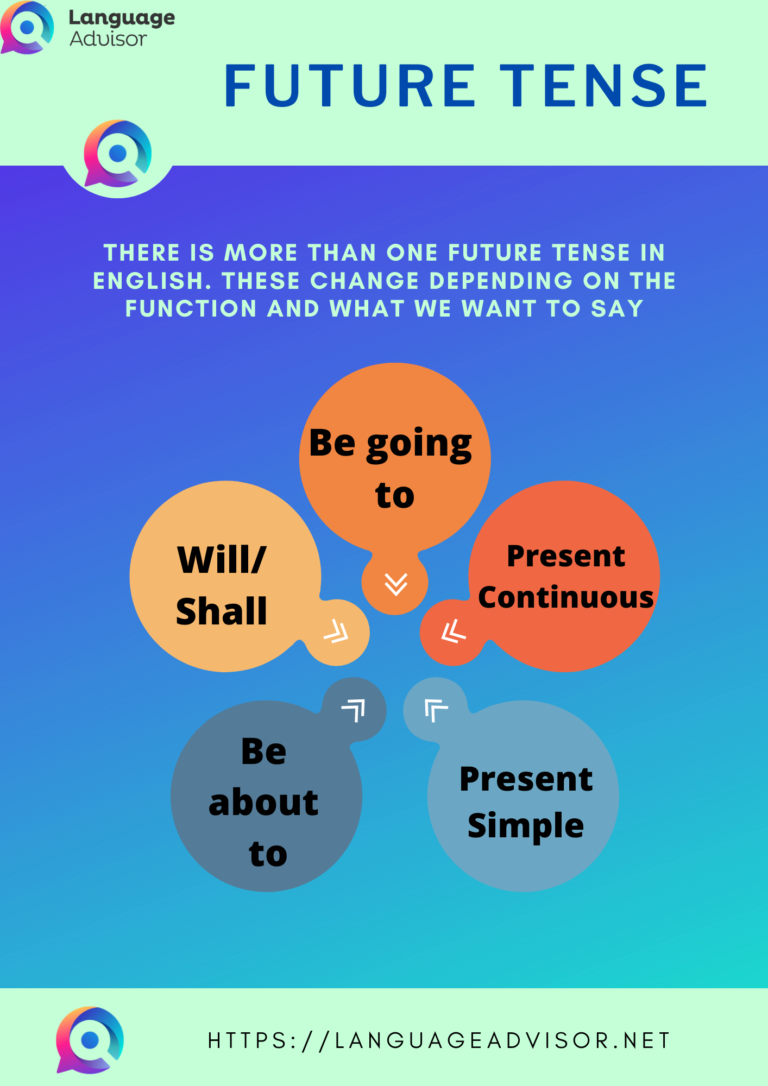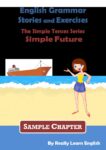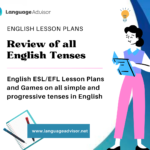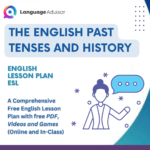All about the Future Tenses. English ESL/EFL Lesson Plans and Games on the Simple Future Tense and Future Progressive Tense in English
All about the Future Tenses

Lesson plans
Here you can find a wide range of full lesson plans to use in your classroom.
All of our lessons are designed around themes engaging and relevant to English ESL-EFL learners and can be used to complement your school curriculum, giving students an opportunity to develop their English language and skills in motivating and enjoyable ways.
These lesson plans focus on classroom games and activities oriented around meaningful practice of grammar items in English. The vast majority of the activities have been designed to be simple and easy to apply, without requiring much in the way of additional resources or materials. Wherever possible, games have been presented in a way that makes full use of any natural or genuine communicative aspects embodied in the grammar constructions, though while there is emphasis on understanding the grammar and its functional and communicative aspects, most of the games also highlight the importance of using the grammar accurately.
These lesson plans are intended as a starting point for teachers to adapt and build their own stock of in-class games and activities that can be applied relatively quickly and easily.

All about the Future Tenses
All about the Future Tenses: Here are seven lesson plans on the Future Tenses

Simple Future Tense
Objectives:
Have the students be able to understand the new topic of the simple future tense.
Presentation:
– Define the Simple Future Tense: The simple future tense indicates that an event will take place in the future.
– Draw the following illustration to help demonstrate your point:
Now
Past ————————-I———X———– Future
– Give some examples of the simple future tense:
– Ex. Jack will finish his homework tomorrow.
I will go to Milan next week.
They will come tonight.
Practice:
– Have the students be able to finish the sentences so that they form a sentence in the simple future tense.
1. I (work) ____ tomorrow. = I will work tomorrow.
2. She (play) ____ in the tournament this weekend.
3. They (go) ___ to the lake for summer holiday.
4. We (learn) ____ a new language by the end of the year.
5. He (ride) ___ his bike to the concert tonight.
7. I (come) ___ to school tomorrow.
8. She (cut) ____ her hair next month.
9. He (try) ____ to build a house by next summer.
10. The class (help) ___ the teacher on next years project.
Homework:
Have the students write 7 to 10 sentences about things they want to do when they grow up. Remind them that everything should be written in the simple future tense.


Future Progressive Tense
Objectives:
Have the students be able to understand the new topic of the future progressive
tense
Presentation:
– Review what a “progressive tense” means: A progressive tense gives the idea that an action is in progress during a particular time. The tense says that an action begins before, is in progress during, and continues after another time or action.
– Define the Future Progressive Tense: The future progressive tense expresses an activity that will be in progress at a time in the future.
Note: Sometimes there is little or no difference between the future progressive and the simple future, especially when the future event will occur at an indefinite time in the future.
– Draw the following illustration to help demonstrate your point:
Now in progress
Past ————————I————X—————–X——— Future
– Give some examples of the future progressive tense:
– Ex. 1) Right now I am sitting in class. At this same time tomorrow I
will be sitting in class.
2) Don’t come over at 9pm because I won’t be home. I am going
to be studying at the library.
3) Don’t get impatient. She will be coming soon.
Practice:
– Have the students be able to finish the sentences so that they form a sentence in the future progressive tense.
1. Yesterday at this time, I was attending class. Tomorrow at this time, I
(attend) ____ class.
2. Tomorrow I’m going to leave for home. When I arrive my whole
family (wait) ______ for me.
3. When I get up tomorrow morning, the sun (shine) _____ .
4. Just think! Two days from now I (lie) ____ on the beach.
5. I (think) _____ about you.
6. I (stay) ___ at the Hilton Hotel. You can reach me there.
7. Next year at this time I (do) ___ exactly what I am doing now.
Homework:
Have the students write 5 to 7 using the future progressive tense. The students should be prepared to share these sentences with the class at their next lesson.


Magic Carpet
Objectives:
Future (decided) actions with “go”
Presentation:
This game is primarily designed to help students apply “going to” for future decisions, but also aims to help students differentiate between the “going to” future structure and the basic “go” verb (this can often be confusing for students when learning this construction for the first time).
Practice
The game is called “Magic Carpet”: the teacher announces that each
student has been given a magic carpet that allows him/her to travel to any place he/she likes the following day.
Students then state where they are going to go.
Teacher: [To student 1] Where are you going to go tomorrow?
Student 1: I’m going to go to Africa. [To student 2] Where are you going to go?
Student 2: I’m going to go to Disneyland. [To student 3] Where are you going to go?
Student 3: I’m going to go to Europe. [To student 4] Where are you going to go?
Student 4: I’m going to go to the North Pole. [To student 5] Where are you going to go?
Student 5: I’m going to go to the moon. [To student 6] Where are you going to go?
Student 6: I’m going to go to Japan. [To student 7] Where are you going to go?
Etc.
To apply 3rd person forms (important in practicing how to convert the “be” verb within this structure), students could then practice summarizing where each student in the class is going to go.


After school today
Objective:
Future (decided) actions
Presentation:
This is a simple game called “After school today”.
Practice:
The teacher writes down 3-5 time (for example 5 o’clock, 7 o’clock and 9 o’clock) that follow the current class time on the same day.
Students make some decisions about what they are going to do at each time and then report these to the class:
Class: What are you going to do at 5 o’clock?
Student 1: I’m going to watch TV.
Class: What are you going to do at 7 o’clock?
Student 1: I’m going to eat dinner.
Class: What are you going to do at 9 o’clock?
Student 1: I’m going to play computer games.


Let’s meet this weekend
Objective:
Future (decided) actions as “polite excuses”
Presentation:
This is similar to the Magic Carpet game except that it is more contextualized and possibly more fun/humorous.
Practice:
The teacher informs the class that it is his/her intention to go to each
student’s home over the weekend to give them some extra English instruction. Of course, students are not likely to be keen at all on this proposition, so they will need to provide polite excuses to the teacher – in this case using “going to ” to show the action planned for the future has already been decided.
Teacher:
May I come to your house for some extra English lessons this weekend?
Student 1:
I’m sorry. I’m going to watch a movie this weekend.
Student 2:
I’m sorry. I’m going to play with friends this weekend.
Student 3:
I’m sorry. I’m going to play soccer this weekend.
Etc.
This game can be extended further, given that an entire weekend represents quite a lot of free time. The teacher could mention specific days and/or times to facilitate a greater range of “excuses” from each student.
The game can also be shifted into third person usage by adapting it so that the teacher pretends to want to come to the student’s house to talk to his/her parents about English grades. In this case, the students will need to create excuses for their parents and apply the 3rd person. Either application tends to be a lot of fun and semi-realistic, as students in general would definitely not appreciate a visit to their home by a teacher, or at least will enjoy pretending that this is the case.


The 3-day President
Objective: Future (decided) actions
Presentation:
This game is called “the 3-day President”, but the title could easily be adapted if the role or time span decided on are different.
Practice:
Basically, students are informed that they are going to be their country’s President for just three days, and they are allowed to make one important change or action for each day of their presidency.
Student 1: I’m going to be the president for three days. On day 1 I’m going to end all homework for students. On day 2 I’m going to fly to India and ride an elephant. On day 3 I’m going to give lots of money to poor people.
Greater variation can be built into responses by giving every student a day of Presidency in sequence. Thus, a student who becomes President on day 5 cannot do or make what a student did as President on day 2 (because the President “is already going to do that”).
Note that while this game can be fun, generally speaking it is hard for students to come up with language for potentially “presidential” decisions, so they may need help in refining their planned actions.


Predictions
Objective: Future predictions based on current events
Presentation/Practice:
For this game, students need to make realistic predictions based on evidence they can see or know in the here-and-now.
For this, they will need a range of prompts from the teacher, for example:
Teacher: There are many big dark clouds in the sky.
Student 1: It’s going to rain.
Teacher: The class test scores were very low.
Student 2: The teacher is going to be angry.
Teacher: She left her jacket at home.
Student 3: She’s going to be cold.
Teacher: He forgot his lunch money.
Student 4: He’s not going to eat lunch today.
Etc.
This game could also be played with visual rather than oral prompts, as it can lead to more creative predictions and give students the opportunity to explain rationales.

All about the Future Tenses: Also Check out these resources on the future tenses


